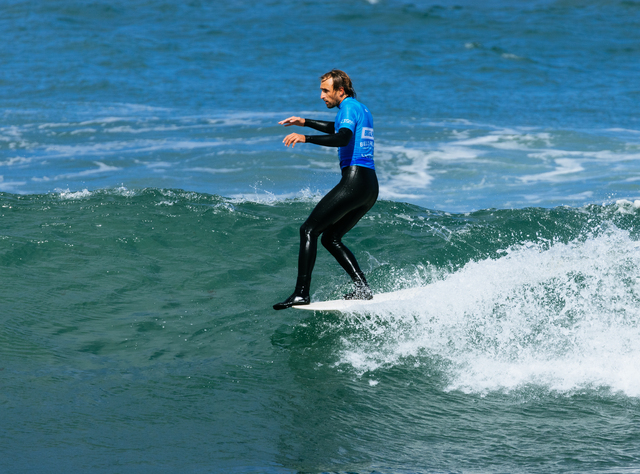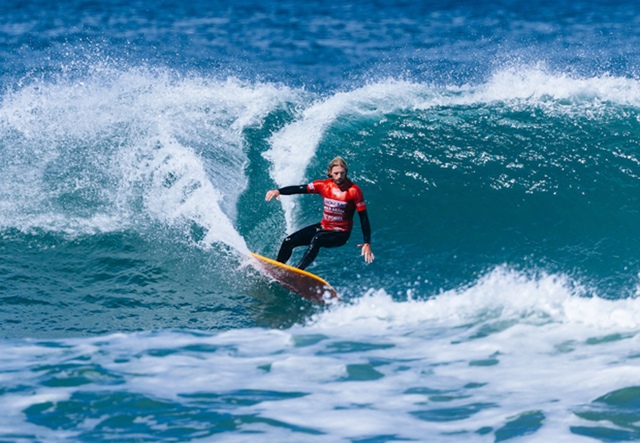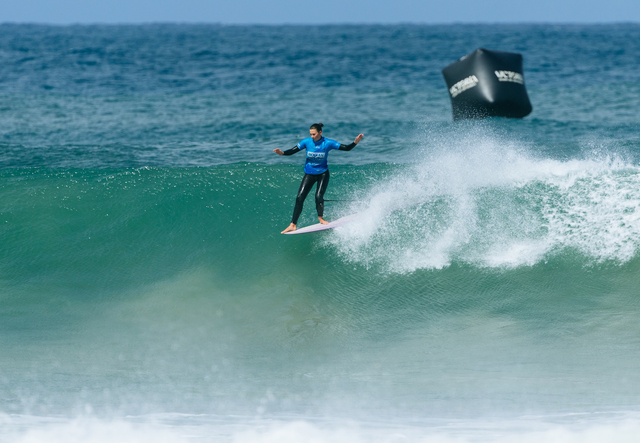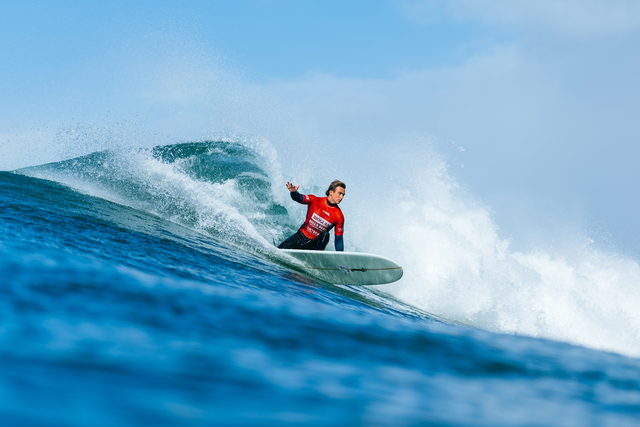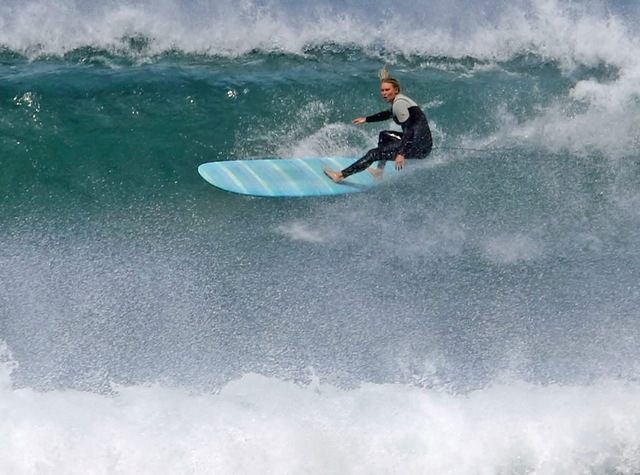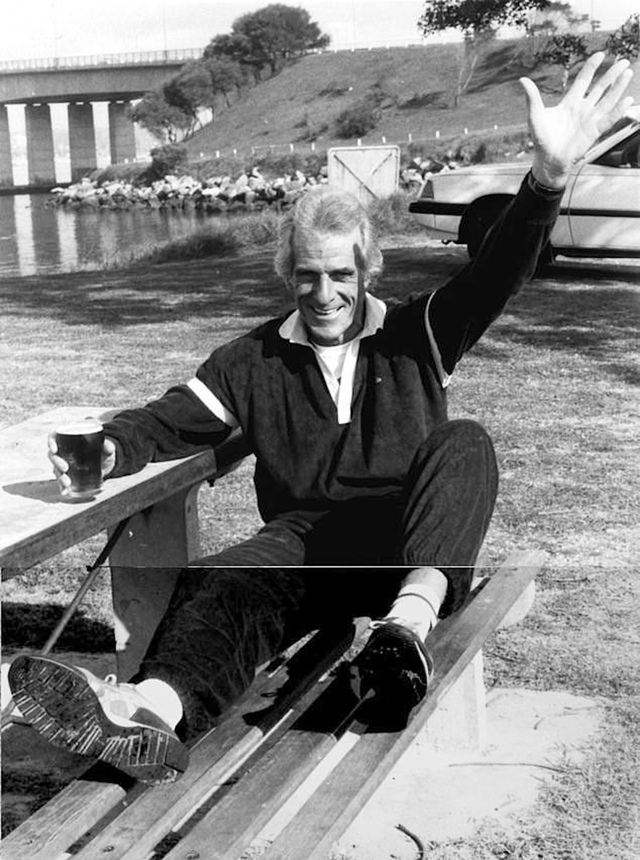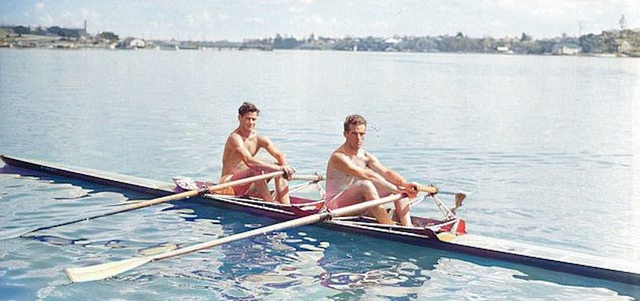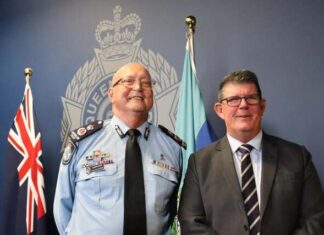I’m calling the Bells Beach Longboard Classic the best mal event of the WSL era, and wedged between the rubbishy beachies of the US Open at Huntington and the boringly perfect lines at the upcoming Abu Dhabi wave tub, it was a timely high.
For one thing, Bells delivered in spring, which Torquay locals will tell you was entirely predictable, but I’m suggesting maybe not often as groomed as it was for most of the Classic. For another, in both the men’s and women’s draw the surfing was high quality, varied and interesting to watch how many interpretations you can put on an over-sized Bells Bowl on a nine-six-plus. And it might be 60 years since we’ve seen that.
Watching just about every heat from home, I thought the whole event was a bit like watching edited highlights of the best years of the Noosa Festival. Granted, whenever the WSL Longboard rocked into our town they got skunked for the most part, running very few
heats at First Point, but Bells, despite the cold and the size, was a very Noosa affair from start to finish, with our world champs Josh Constable and Harrison Roach in the commentary box rather than in the lineup, along with Noosa-adjacent mates the Waxhead and Sam Bleakley, while in the water Clinton Guest, Kirra Molnar and Emily Lethbridge were back to their best form.
But undoubtedly Noosa’s best performer at the event was our adopted daughter Mason Schremmer, who shredded with style and flair to finish fifth. Ah, took me back a decade or so to the days when their lovely mum would fly the Schremmer sisters from Hawaii for the festival where they’d whoop it up on the beach all week and compete with distinction in the junior girls’ events. Now Mason wears the stars and stripes on her jersey but her heart is in Noosa, and she did us proud at Bells.
My two current favorites on the men’s tour are Kai Ellice-Flint and Dr Max Weston, both incredible stylists who have been around for a long time, but have only emerged as title contenders in recent seasons. Now the two mates are sitting at one and two in the rankings, after Kai won in the Huntington slop and Max was the surfer of the event at Bells, and both have already qualified for the El Salvador finals. And a big shout out to Kevy Skvarna for a gutsy second, and to JR Esquievel of the Philippines for being so damn entertaining.
In the women’s Malibu’s Soleil Errico has now won the last three Bells events and is well on her way to a fourth world title, but my personal fave was the ever-stylish Kelis Kaleopaa, the Hawaiian who rarely puts a foot out of place, with Japan’s veteran Hiroka Yoshikawa also getting a thumbs up for never surrendering and taking it up to Soleil from an early combo in the final.
Happy 100, Muzz
I doubt that many will be celebrating it, but this Sunday, 5 October, marks the centenary of the birth of one of Australia’s most colourful crims, a one-time Olympian and a gold medallist in the bent cop event until Roger Rogerson shot his way past him.
Murray Stewart Riley, born in 1925 and a policeman from 1943 to 1962, a champion rower through the 1950s, winning gold in the double sculls with his partner Merv Wood (an honest cop who later became NSW police commissioner) at two Empire Games, and bronze at the Melbourne Olympics, was by the mid-1960s a major criminal and drug trafficker.
I met Murray in 1984 on his release from Long Bay Jail after serving six years for his failed attempt to smuggle in 4.5 tonnes of cannabis in the yacht Anoa, and I was commissioned to write a book about this and his other exploits. When Murray turned up at my little terrace house office for our first interview, his first words were: “Can we do this outside?” Sure.
I took two folding chairs into the postage stamp backyard where we could sit in the winter sun and he took me by surprise when he immediately stripped down to his undies so he could work on maintaining his deep tan acquired from the sun deck of the remand centre. While most serious criminals did their time in the industrial prison, “Muzz” had scammed his way into remand, where other privileges included supply of alcohol and occasional afternoon “leave passes”.
The book, called Scammer, eventually had to be abandoned because Muzz couldn’t lie straight in bed (surprise, surprise) but somehow we became friends. When our home phone (pre-mobile) was answered by one of our young daughters, Muzz took great delight in putting on a funny voice and saying, “Tell your dad to call the scallywag!”
I was able to resist his frequent suggestions that he could help me find quicker ways to make a buck than writing stories, but when he invited us to dinner at the Hunter’s Lodge, famed for its fine Hungarian cuisine and dodgy clientele, I couldn’t say no. When we arrived the restaurant was empty, save for Muzz and his partner seated at the best table and five musicians in tuxedos serenading us from a mini-stage in the corner. Well, we drank, ate and danced the night away, and before leaving, Muzz slipped the maître-d’ a bulging brown paper bag of cash.
Muzz wasn’t happy when I explained that we couldn’t proceed, but for quite a few years the scallywag phone calls continued, with him asking about my family and career and never revealing anything about himself. As it turned out, he was in the UK and convicted of trying to defraud British Aerospace of £40 million (his first attempt at computer fraud). But in 1993 he simply walked out of the open prison where he was serving a five year sentence and was never seen by law enforcement authorities again.
Muzz apparently resettled in Australia and spent the last years of his life keeping a low profile in Queensland. In December 2020, he was reported to have died at age 94, months earlier on 1 April. The date may be a clue. Perhaps the scallywag is still sunning himself on a deserted beach somewhere. If so, happy hundred, Muzz!

